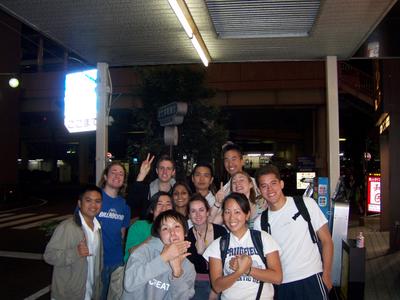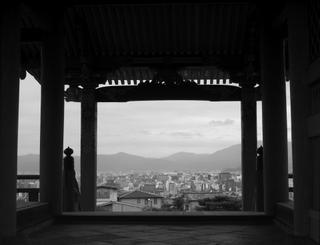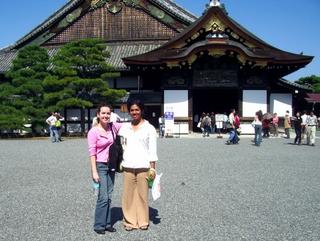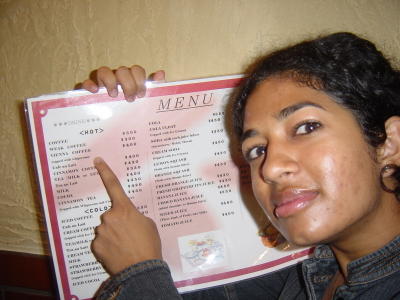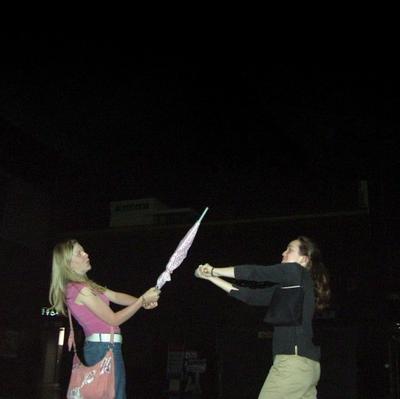31 October 2005
You Get What You Settle For
You get what you settle for.
Or, for the English critics, "You get that for which you settle." Yes, I am aware of the preposition rule.
I saw this on a Maxwell friend's profile about 4 months ago, and it's been nagging me ever since. Why? I have tried to live my whole life knowing full and well why I do the things I do, going for what I really want, and never settling for anything. Living like this does not come without consequences (people saying you're too picky, too uptight, or you struggle to maintain a balance between achievement and contentment, etc.) But perhaps I just hit the nail on the head: the balance between achievement and contentment is something I've been trying to figure out ever since a great conversation in Norway about 3 years ago. I can't see where my life is going. I believe that, at this point, I can still make it anything I want. I am happy with where my life has been...but I am no closer to answering this question than I was before.
I think Thelma and Louise got to me because I can feel myself sliding more and more into the contentment side of things. If you're happy with the way things are, you stop striving for so much. I can't decide if this is good or bad. It also makes me feel like I'm getting older. I remember learning in my Developmental Psych class that the older people get, the more content they become with the way things are. They come to accept their decisions and their places in life, and they stop worrying so much about "getting somewhere" else. But should I allow myself to fall into that comfort mode so soon? I think not! But it's starting to happen! Help!
Or, should I just be happy about it, and let it all go? Go with the flow, go where the wind takes me, what happens happens, and I'll be content with whatever.
As much as I agree with Buddhism, this is the snag that gets me every time: if you're content NOW, there's no reason to IMPROVE. Which side of this coin is more important? The obvious answer is, "Well both, of course. You have to find a balance." But that's taking the easy way out. Right now, I AM LIVING the balance...yet this question is still bothering me after 3 years.
I want to shout, "Settling is bad! Keep going! Always strive for the absolute best!"
But are those really my own thoughts, or someone else's?
Goethe said, "When you trust yourself, you will know how to live."
But if your self is telling you two different, diametrically opposed things...you're stuck.
Who was Goethe, anyway?
30 October 2005
A Morning in the Life, Part 2
When I get to school, the first thing I see is a circle of construction workers. (The gym is under repair to better withstand earthquakes.) Every morning at 8 am the construction men--decked out in hard hats and knickers that date back a few centures--stand in a circle to stretch, bend, and pliee (sp?) their way to flexibility for a productive day of gym repair. Because they all stretch in unison to an obvious count, it looks like ballet class. A ballet class of Japanese men in hard hats and knickers.
28 October 2005
Quote
"Each loss of life is heartbreaking."
Each loss of life is heartbreaking?
How dare he.
24 October 2005
Fuji Crew
Soccer
Nobody told me the teacher soccer teams were mainly MEN. Mayumi and I were the only women on the field. And we subbed for each other, so we were never playing at the same time. The whole second half, I was the only woman out there, and of course the only foreigner at the school. When Mayumi handed over her jersey, she said, "They're afraid of offending women, so when the ball comes to you, they won't get close." She was right. I did manage to get my foot on the ball a couple times, but that's as far as my ten-year-rusty soccer skills would take me tonight. But have no doubt, I had an absolute blast. All the teachers, including the prinicipal and vice-principal, plus the guys' baseball team, and the guys' soccer team, were cheering for us. It was embarrassing, yes, especially when the baseball team kept yelling something at me that I couldn't understand. And we lost 0 - 3. But nobody really cares -- they're just happy to be out there participating. And that is what makes me happy, too.
I think Maxwell House--if not my high school tennis team--was a good introduction to be part of a group. Maxwell was close, but other than party preparations, there was not much group effort or codependence. The goal was mainly to have fun together, which fostered a group mentality, but only to a certain extent. It goes way beyond that in Japan. Unless you never participate in school activities (which some ALTs choose to do) you are immediately expected to be part of the group. And the more you get involved, the more you get involved. (There's an away soccer game next Monday! I'm going!)
I'm so used to working and doing and pursuing on my own -- granted, I do everything with the support of many loving people, and for that I am grateful. But in the ultimate moments, I am alone. I am American. I'm strong. Hence, I'm independent, and "alone" is a good thing. But not in Japan. If you make an initial, genuine effort to get involved, Japan offers a positive group mentality that I've never experienced--and don't think I could ever experience--in the United States. Now, this does not mean I know everyone well, or that everyone is my friend. That is certainly not the case. At first, I even felt smothered by this system. If you spend all day at work with the same people, why would you want to socialize with them after hours? Don't you need to get away? But I tried to supress that reaction (which I blame on American culture, if not my own ideals) and just go with the flow. These are your people, and you chose to come here, so fall in line with everyone else. When in Rome... And as you gradually get used to it, and start to understand things a tiny bit more, you come to appreciate it so much. I am accorded a certain amount of respect for showing up and participating, which I am in turn expected to show others. And because I do make an effort to show others that respect, I feel like I have a purpose. There is an understanding that everyone needs, and therefore helps, everyone else. Some of my closer friends have told me that I'm lucky, because the people at my school are friendlier than most. And I think this is true, but if you look for this anywhere in Japan, you'd know what I'm talking about.
I guess being the foreign girl, I get lucky with both sides of the coin -- I get the benefits of the group, but because I stand out so much, I also get individual attention that is really undeserved, but given to me anyway.
And then I get to come home to my own apartment, and be truly alone, for the first time in 12 hours. And I can't help but think of everyone in the States, the people who love me even though I am all the way over here. For right now, I don't know how else to give anyone a part of this, or share it, except to write this silly blog, and send ridiculous emails, and hope they make you happy.
How lucky we are to be where we are. Take care.
Japanese "Fun & Games"
And today, there's a teacher soccer match against another high school. I don't play soccer, but participation is "mandatory" for young, single people. So after I help carry out gallons of hot tea and miso soup, I'll be kicking a ball for the first time in, oh...10 years. Damn I'm old. :) It's pitch black and freezing outside, but I'm excited anyway.
Last time I played soccer I was in braces. Maybe tonight my lips will stay in one piece.
22 October 2005
Beautiful
-- Sogyal Rinpoche
20 October 2005
The Language of Love
Yesterday a guy friend IMed me with the greeting, "I will never understand the female mind." And to this I replied, "Honestly, me neither." I tried to help him, but who knows if any real progress was made.
The American guy here and I fight all the time -- more than I've ever fought with anyone. It's ridiculous and the "discussion" is always the same. It begins:
"Wow she's hot" or "You look good in that" or "Why don't you drink some more alcohol?" or (so classy), "There's my baby's mamma."
Then, I respond with something resembling the following: "Could you save those comments for your guy friends? I'm not a guy. You sound so chauvinistic."
He says, "I'm not chauvinistic. You're a femme-nazi."
She says, "All you look for in a woman is her body. I feel like you don't respect me at all. And if by pointing that out, I become a femme-nazi, that just proves my point even further. Let's not hang out anymore."
He says, "Fine."
And I feel relieved and happy for a little bit.
Until we start hanging out again.
Real mature, I know, but it goes on and on like this, again and again. Finally tonight I said,
"If there's something you want to tell me directly, then say it. Get it off your chest. I'm tired of this pent-up hostility and I'm tired of arguing with you. What's the problem?"
Guy responds with muddy words (so this is not a direct quote), "You accuse me of things when you don't really understand. I'm not chauvinistic. But I like you and you don't like me back. So how do you expect me to act around you?"
Me: What? Like me? What are you talking about? If I don't want to date you, that means you should pare all women down to their boobs? And anyway, at what point in your ramblings about how hot other women are was I supposed to know you like me? You brag about how you have more romance in your pinkie than most men have in their entire bodies -- but trust you, you haven't worked your magic in Japan because nobody has been worthy of your sparks -- where in this was I supposed to realize or understand or guess that you liked me? Or that you were ever trying to show that you liked me? And why on earth do you like me if we're always fighting about such fundamental ideas?
I think all this, but I say only, "I don't understand what you want."
He says, "I guess I don't either."
And so it goes.
A friend of mine in college studied abroad in South America. One day, he sent an email declaring his love for a Chilean girlfriend. Funny thing was, they could barely speak because of the language barrier, and he was the first to admit it! At the time, I laughed at him. "He thinks he loves some girl he can't even hold a conversation with." But really, how much better do I understand a guy because we can talk to each other? Most likely, the level of communication stays the same, regardless of who is saying what and how. Guy will always speak "guy," and girl will always speak "girl," and this talking at each other will be labeled "communication."
Even if you can both write in Kanji, you probably can't speak the same language. Suddenly the term "language barrier," at least in matters of the heart, doesn't mean much to me anymore. People think English is hard because there are many exceptions to the rules. But love doesn't have any rules -- there's no foundation from which to deviate.
I think I'll be alright with Japanese.
17 October 2005
Yamanashi / Nagano
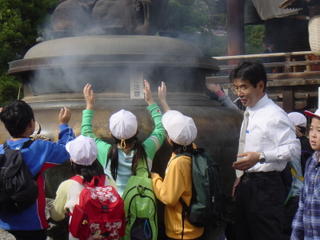
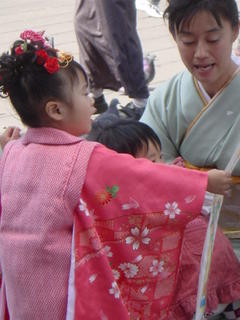
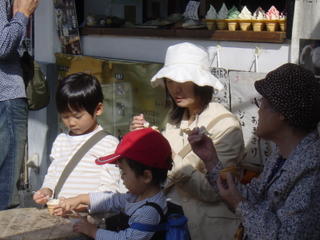

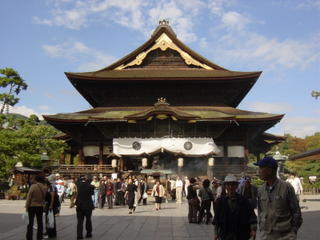
We were supposed to go hiking, but it was pouring on the trail...so we drove through to Nagano for a picnic and temple visit instead. Pic details: The smoke cures sickness and brings good health when it touches your head. Families celebrate when girls turn 3 and 7, and when boys turn 5 (I think that's right). Ice cream, however, is for all ages...and check out those dogs walking themselves!
15 October 2005
Cafe Break
Geisha Photo
Dork
What does this say about my future? I have no idea. Just don't tell anyone, okay?
Today, I tried explaining the terms "dork" and "nerd" to a fellow teacher. I described a smart, antisocial, skinny guy with over-size glasses and a pocket protector.
"Ohhhh," she laughed, "there's one in every class."
"Yeah," I agreed.
The truth is, there are at least two dorks in every class. But only one of them is a skinny guy with a pocket protector.
12 October 2005
Distinctive Taste
"I hurt the environment because I breathe air every day."
"I hurt the environment because I eat a lot of vegetables."
"I help the enviroment because one day my friend threw trash on the ground, and I told him to pick it up."
----
I want to be an awesome cook. And I want to look good doing it. And to think, some people would call me a feminisit! :) Tsk, tsk.
Last night I cooked a really good dinner and brought the left-overs in for lunch. To my embarrassment everyone commented on how good my massala chicken smelled. I hope they were being honest.
The wafts from the microwave started a whole discussion of food. Did I like squid? (No.) Octupus? (No.) Sea urchin? (Haven't tried it yet.) Raw salmon eggs? (Yes.) Nato? (So-so.) What did nato taste like to me? (Fermented coffee or cacao beans.) Really? Japanese people don't think so; I do not have Japanese taste!
But, my supervisor understood why nato tastes like coffee -- it's all about the beans. Nato is fermented soy beans that are light brown. If you imagine chocolate or coffee when you eat them, that's exactly what they taste like. Ishii Sensei tried explaining my American sense of taste to everyone else, but I don't think they got it.
"My husband hates nato because it smells like dirty socks." Ishii Sensei said. I laughed.
"It does smell bad, but I'm okay with it because I like French cheese. They smell awful but they taste amazing."
Then Ishii told me how she had seen "Heidi," so when she had the chance, she was thrilled to taste European cheese. When someone offered her goat cheese, she expected it to be really good, so she accepted.
"But when the cheese was one foot away from my nose, I almost fainted! I couldn't taste it, it smelled so bad."
Ishii's re-enactment of her fainting made me crack up. She held a ruler in front of her face, slowly drawing it closer and closer to her nose, whining in mock apprehension. Then when it was a foot away, she fell over in her chair. I almost had tears in my eyes I was laughing so hard.
"Goat cheese is my favorite cheese!" I said. It was true.
"Ohh no!!!" she cried. "But I almost fainted!"
Some tastes can cross borders, but many will remain distinctly Western, and distinctly Japanese.
11 October 2005
Ghost of a Geisha
When I came to Japan I had three goals of what I wanted to see / visit: islands, snow, and Kyoto. What I mainly wanted from Kyoto was temples (solid, predictable) and a geisha sighting (fat chance). "Geisha sighting" makes them sound like rare, wild animals. This is because they are. There are millions of people in Japan and less than 1,000 geishas in the whole country. Hoping to see one is like waiting for an endangered yellow bird to flash through the trees. If you're lucky enough to get a glimpse, you'll remember it for the rest of your life, and at some point you will probably try to write about it.
We just finished a luxurious Japanese dinner, complete with cold sake, and stepped out onto the chilly street of Pontocho. It's a narrow, winding alley packed with a variety of restaurants, adorned with lanterns and banners that many people believe were the world's first advertisements. We were laughing and immortalizing the food that had just passed our lips. The next thing I knew, my bottom jaw shot towards the ground. I feet melded to the cobblestones and I couldn't move. In slow motion I turned to my friends -- both of them had huge eyes and open mouths. We exchanged glances for a millisecond before we spun around and began walking in the opposite direction.
A geisha had appeard from nowhere, right in front of us. Despite the heavy wooden clogs on her feet, her movement was absolutely silent. She moved as smoothly and as quickly as a deer. Although we had immediately turned to follow her, we had to jog to keep pace.
Her kimono was made of thick silk and mostly white. Her inky hair was impossibly styled, a dash of red fabric visible through a slit in her bun. There was an unexpected, reddish-brown arch painted on the nape of her neck. Except for this, I saw no flesh that was not transformed to porcelain by thick, white makeup. Not even her hands remained flesh. Her lips were slicked with red. And she was moving so fast.
The three of us were silent. We were shocked into awe; her grace and presence was like nothing we had ever seen before. I wasn't even embarrassed that we were following her -- who cares if people talk about the silly gaijins? It was then I realized that everyone around us, even the Japanese, were reacting the same way. Japanese girls dropped their jaws and turned to stare, whispering to each other. Men began to follow her. In a few minutes, my friends and I were the caboose of a train led by 5 Japanese men in suits. All trying to keep up with this silent white deer. I was afraid that if I took my eyes off of her for a second, she'd vanish. Her speed and her all-white kimono made her like an apparition, not a flesh-and-blood woman like the rest of us, clicking our heels on the Pontocho cobblestones. We didn't even care how far she would walk or where she would take us -- we just wanted to follow.
At one point, the geisha looked over her shoulder, and I could see the tension around her eyes and mouth. She knew the men were following her, and it made her nervous. My friends and I were too far away. I felt a brief flash of sympathy, the kind of pity you'd feel if roses cried when they were plucked and stuck in vases. I considered backing off a little, but before I could make up my mind, she was gone. She disappeared so quickly I didn't realize it until after. There were no corners, no turns in the street -- but she threw aside an unlabled bamboo door, and was gone. The businessmen were equally surprised by her disappearance, and they gathered at the door awkwardly, like pigeons begging for crumbs. My friends and I continued walking at the same speed, looking straight ahead, disguising our intentions much better than the Japanese men. You'd think they'd be skilled at this by now. But this was one thing I learned: geisha appearances are just as rare for the Japanese as for foreigners.
When we could finally speak again, Natasha said, "Was that real? Was I dreaming?" Our thoughts spoken aloud. "Could there have been a more perfect ending to this night?" Kath asked.
She was just a lady, in a white robe, wearing white make-up. What's so special about that? Were we horrible Westerners for getting so excited about it? For exoticizing someone like that?
I don't think so.
Even Africans are afraid of lions. And even Japanese are astonished by the ghost of a geisha.
10 October 2005
Kyoto Station
Most of Kyoto, despite popular belief, is not beautiful. The majority of Kyoto looks like the outskirts of Paris: large, blah, post-post-modernist architecture, mainly apartments and office buildings. Except for a few treasures IN the city, like Nijo Castle and the Pontocho / Gion area, most of Kyoto's attractions are on the outskirts. You can visit a temple and feel like you are in a small mountain town. The air is fresh, the hills are green, the streets are charming and steep, the temples are humongous, beautiful, and thousands of years old... Then, you walk only 30 minutes to reach Kyoto station, which looms like the freakish offspring of a skyscraper and a metal spiderweb. It's one of the largest and strangest buildings I've ever seen. All this time, we believed Star Wars was filmed using a miniaturized, hand-crafted set! No way! It was totally filmed inside Kyoto Station. At 1 am, when all the lights were off and it was deserted, Darth Vader made an appearance and we all ran screaming from the station.
During the day, Kyoto Station is an attraction in itself. It swarms with people and offers interesting views of the city. The maze of walkways led us up 6 large flights of stairs because we tried taking a "shortcut." What we discovered on the grey "rooftop" was a veritable Lovers' Lane. Archways and columns formed small crannies and every space was claimed by a couple. Every 5 steps we intruded on lovebirds parked on the floor. One girl was even sitting on her guy's lap. Aside from men reading porn on the train, it was the most shocking display I've seen in Japan. There is SO little contact between ANYONE that this tiny display (seen everywhere in Paris) seemed almost raunchy in Japan. I guess people thought they'd find privacy there, thanks to the huge and endless flights of stairs.
06 October 2005
A Morning in the Life
A Morning in the Life of Lauren, in Japan. I wake up a few minutes before my 6:15 alarm. I stretch a couple times. I pretend it's the weekend and that I could doze all day long if I pleased. In fact, I do just that, and manage to fall back asleep before my alarm, so that I am finally awakened to an incessant beep.
Slap the alarm. Pad to the bathroom. Say good morning to the 3-inch long cockroach I have trapped under a plastic cup. After I greet him I apologize for trapping him. Normally this plastic cup is used for tossing bugs off my balcony, instead of holding them hostage. But once I managed to trap the cockroach, I decided he was too big and too angry to toss off the balcony with only two hands. I was afraid he'd escape and fly in my face before I could get him outside. So I need help granting him an exit other than death. (He is WAY too big to kill -- I refuse to end the life of something that would squish, crunch, or exhale significantly upon death. It's just too cruel.) So I procrastinate his liberation.
Now, you may be asking yourself, "Does she really think a plastic cup is going to hold a 3 - inch cockroach?" No, silly, of course not. On top of this cup, I have constructed a minor Sears Tower of Listerine, shampoo, and hair gel. When he knocks around on the cup, I add fingernail polish to the top. So in the morning, as I avoid knocking over the tallest tower in Japan, I apologize to the cucaracha for his tiny cell. I feel sorry for him only long enough to remember his dire mistake: he flew at my face while I was sitting on the toilet. The result wasn't pretty for either of us.
After I get ready for work/school, I pass at least 6 skinks (blue-tailed lizards) sunning themselves on the walk. These creatures are so predictable. I appreciate the stability, so I say good morning to them all. Then I take my place at the bus stop and wait for The Pink Lady. I know that when I see The Pink Lady, the bus is on its way. If there is no Pink Lady then I have missed my bus (which by the way, never happens, because the bus is always 2 - 15 minutes late). The Pink Lady is a woman who drives a PINK motorcycle/motorbike. It must have been expensive, because it's the ONLY one in Japan. If it is raining, then she wears a pink, full-body, raincoat-jumpsuit getup. If it's not raining, then she wears a pink jacket to shield her (pink?) blouse from the wind. The Pink Lady always brings a big (pink?) smile to my lips, and it is then that I decide today will be a good day.
05 October 2005
Kyoto
Riddle
Students were told to choose the "most important" person, and then arrange all 6 people in order of importance, or priority for being rescued.
(If you're interested, decide your order before reading on).
Students worked in groups to make their choices, and then wrote the results on the board. I was surprised to find that each group selected the SAME person to be rescued first. Likewise, each group selected the SAME person to be rescued last. Which people do you think they chose? None of their answers coincided with mine. I was intrigued.
Each student believed that the sick man in his 60s should be the first person rescued, because he was most immediately in need of help. When they had to prioritize, each student chose the Buddhist priest as the one to be saved last. Explanations for the Buddhist priest were all similar, but each student had a unique--and fascinating--translation of the idea. One said, "because he is best prepared to receive destiny;" or in this case, death on a deserted island. Another said, "because his spirit is strong." Yup, there's plenty of time for zazen on a deserted island. But sadly, no one to beat you with a stick.
(Joking aside, I have an enormous amount of respect for Buddhism and anyone who makes a genuine effort to practice it).
My goal was to maximize life. So, I chose the famous doctor as the first person to be rescued. Hopefully, many lives could be saved if the doctor returned to society. Following this model, my 2nd choice was the pregnant woman, because one rescued pregnant woman can mean 2 saved lives. For last place, I chose the sick man in his 60s, because he had the smallest chance of survival no matter where he was.
My students seemed really shocked by my choices, so it turned out to be quite a cultural lesson for all of us. Of course, the more I considered it, the more confused I became. Japanese people usually consider the group before the individual. Americans usually put the individual before society. But it seemed that we had done just the opposite: by saving the old man, the students were focused on individual needs. By saving the doctor, I was focused on societal needs. Why the switch?
The only explanation I could come up with is that I examined the problem from outside the group, and the students examined it from inside the group. It should not be surprising that the American set herself apart, while the Japanese were inclusive of everyone, even themselves. Ultimately I was trying to benefit myself. I thought I was trying to benefit society, but in this case, society = me. The students were trying to benefit only the group, by saving the person most in need, regardless of the people outside.
What do you think?


